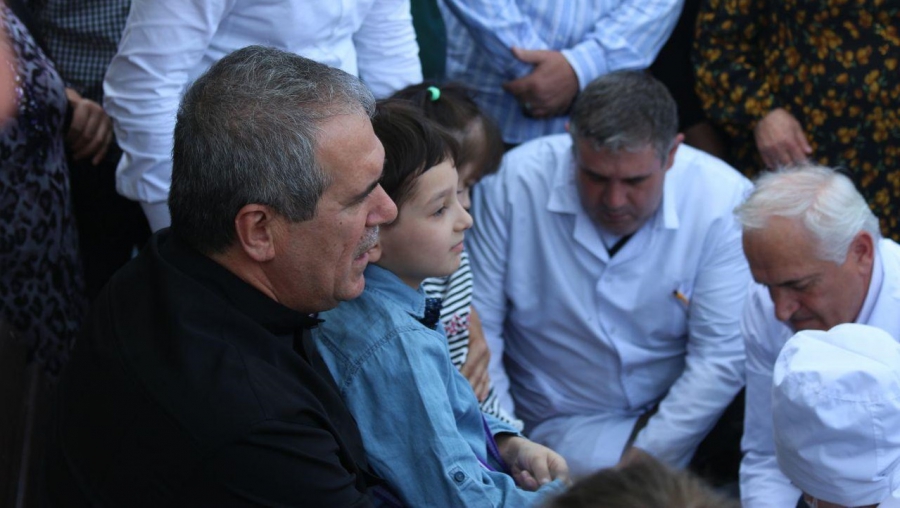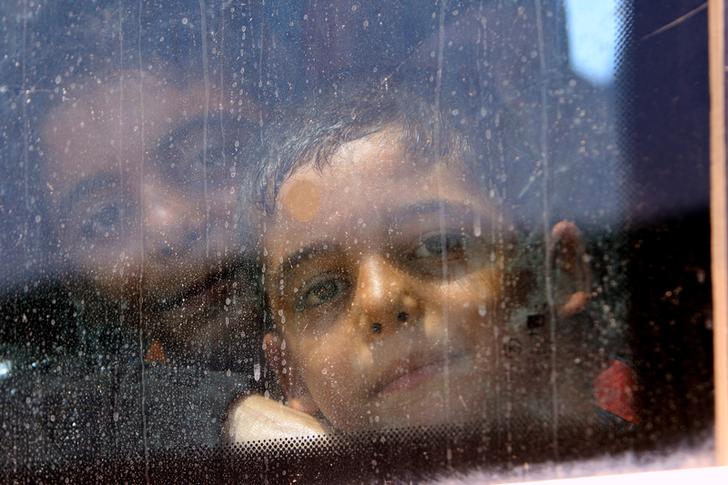The saved children of Mosul

Based on reports from the Caucasian Knot
Two children were recently brought back home to Grozny – a 7-year-old girl and a 9-year-old boy. Both children are Chechen, and were taken a year ago to the Middle East by their parents who were in all likelihood Islamic State militants or connected to this terrorist organization.
“The children had been burnt by missiles that struck Mosul and they need medical care,” stated Ziyad Sabsabi, a representative for the Head of Chechnya for the Middle East and North Africa and member of the Federation Council of Russia. He said that the parents of the children had died.
“The parents of the boy, incliding his brother and two sisters, died. The soldier that found him thought that the child had been fitted with explosives, but the boy was able to convince a person with an automatic weapon that he had nothing on him. The girl’s legs were seriously burnt. She was given medical care right at the airport. Her parents, two brothers and sister had died on the spot,” Sabsabi said.
“The data concerning our citizens and the details [information regarding citizens] changes everyday. We receive new information and check every message daily. We found out about the existence of a camp to the north of Mosul and, according to our data, there may be as many as 70 – 120 Russian and CIS [Commonwealth of Independent States] citizens. This includes Azerbaijanis, Uzbeks and Tajiks,” Sabsabi told RIA Novosti [Russian International News].
The children who were freed have been returned to their relatives: it has been reported that in Chechnya, both children have relatives on their father’s and mother’s side.
Relatives are asking to return the children
“It is often the relatives who request that the children who are abroad be returned home. After the first child was returned from Syria to Chechnya on 1 August, relatives started appealing to the authorities more frequently,” a local NGO employee, who wanted to remain anonymous, told the Caucasian Knot.
The relatives of the children started to actively appeal to NGOs, international organizations and to the leadership of Chechnya for help on returning the children and grandchildren from Iraq and Syria, said the NGO representative.
“Every mother and grandmother hopes that their children will be amongst those saved,” she added.
In mid August in Grozny, women marched along the city’s streets and requested the Chechen government and Ramzan Kadirov personally to coordinate actions to return their relatives from the territories of Iraq and Syria. It was then assumed that there were 48 children in Iraq that had been taken out of Russia by their parents.
On 1 September a special flight arrived from Iraq: four women and eight children were on board. A relative of one of those freed, Iman Muzayev, said that the mother of the young woman had actively lobbied for the freedom of her daughter:
“She participated in the women’s march in Grozny; she asked the authorities of Chechnya to return [her daughter] home. From the early 2000s, Iman lived in Kazakhstan. When she left for Syria, she had only one son back home and two others who were born in Syria and Iraq. The older of the two is four years old, and the younger is only 6 months old. Iman’s husband was killed last year. Unfortunately she was not able to get out of Iraq with her children on her own,” said a relative of Musayev to a correspondent of the Caucasian Knot.
Orkhan Jemal, a journalist from Forbes, said that the issue of evacuating children from the zone of military action in the Middle East came up in July of 2017.
“The problem of bringing children out of Iraq became very prominent after the storm of Mosul. Many children died there, and those that lived were in a terrible situation: their parents had died, and the children themselves were in politically hostile surroundings. It was absolutely impossible to decide what should be done about these children,” said Jemal.
The Human Rights Commissioner in Russia, Tatiana Moskalova, appealed to the United Nations High Commissioner for Human Rights, Zeid Raaad al-Hussein, and to the Secretary General of the Council of Europe, Turbjörn Jagland. Her appeal spoke of the horrible treatment of women and children by militants in liberated Mosul, whereupon she requested that they ‘support the position regarding the discussion on the harsh treatment given to Russian women and children who had been detained by the authorities of Iraq during the operation to liberate Mosul from terrorists’.
Why are the children taken to war?
Supporters of radical organizations bring their families to Syria and Iraq because they do not intend to return to their homelands, a former militant told the Caucasian Knot. He was able to return to Russia after he was disappointed by the ideas of the ‘Islamic State’.
Moreover, many children were born during the war: Chechen rights defenders claim that in recent years dozens of young women have left for Syria.
In July, an unnamed source in the Ministry of Internal Affairs of Chechnya told the Caucasian Knot that there may be hundreds of Chechen children and women in Syria and Iraq.





















